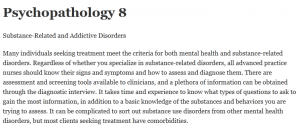Psychopathology 8

Substance-Related and Addictive Disorders
Many individuals seeking treatment meet the criteria for both mental health and substance-related disorders. Regardless of whether you specialize in substance-related disorders, all advanced practice nurses should know their signs and symptoms and how to assess and diagnose them. There are assessment and screening tools available to clinicians, and a plethora of information can be obtained through the diagnostic interview. It takes time and experience to know what types of questions to ask to gain the most information, in addition to a basic knowledge of the substances and behaviors you are trying to assess. It can be complicated to sort out substance use disorders from other mental health disorders, but most clients seeking treatment have comorbidities.
This week, you apply DSM-5-TR substance use and addictive criteria as you formulate a diagnosis for a patient in a case study.
For this Assignment, you will practice assessing and diagnosing a patient in a case study who is experiencing a substance-related or addictive disorder. With this and all cases, remember to consider the patient’s cultural background.
To Prepare:
- Review this week’s Learning Resources and consider the insights they provide.
- Review the Comprehensive Psychiatric Evaluation template, which you will use to complete this Assignment.
- select a specific video case study to use for this Assignment from the Video Case Selections choices in the Learning Resources. View your assigned video case and review the additional data for the case in the “Case History Reports” document, keeping the requirements of the evaluation template in mind.
- Consider what history would be necessary to collect from this patient.
- Consider what interview questions you would need to ask this patient.
- Identify at least three possible differential diagnoses for the patient.
Complete and submit your Comprehensive Psychiatric Evaluation, including your differential diagnosis and critical-thinking process to formulate primary diagnosis.
Incorporate the following into your responses in the template:
- Subjective: What details did the patient provide regarding their chief complaint and symptomology to derive your differential diagnosis? What is the duration and severity of their symptoms? How are their symptoms impacting their functioning in life?
- Objective: What observations did you make during the psychiatric assessment?
- Assessment: Discuss the patient’s mental status examination results. What were your differential diagnoses? Provide a minimum of three possible diagnoses with supporting evidence, listed in order from highest priority to lowest priority. Compare the DSM-5-TR diagnostic criteria for each differential diagnosis and explain what DSM-5-TR criteria rules out the differential diagnosis to find an accurate diagnosis. Explain the critical-thinking process that led you to the primary diagnosis you selected. Include pertinent positives and pertinent negatives for the specific patient case.
- Reflection notes: What would you do differently with this client if you could conduct the session over? Also include in your reflection a discussion related to legal/ethical considerations (demonstrate critical thinking beyond confidentiality and consent for treatment!), health promotion and disease prevention taking into consideration patient factors (such as age, ethnic group, etc.), PMH, and other risk factors (e.g., socioeconomic, cultural background, etc.).